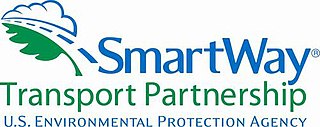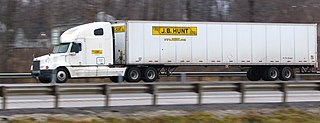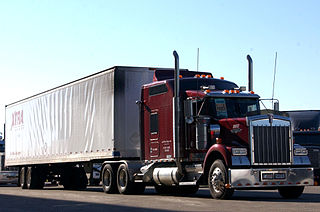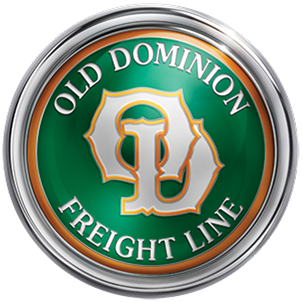
A semi-trailer truck, also known as a semitruck, is the combination of a tractor unit and one or more semi-trailers to carry freight. A semi-trailer attaches to the tractor with a type of hitch called a fifth wheel.

A truck or lorry is a motor vehicle designed to transport cargo, carry specialized payloads, or perform other utilitarian work. Trucks vary greatly in size, power, and configuration, but the vast majority feature body-on-frame construction, with a cabin that is independent of the payload portion of the vehicle. Smaller varieties may be mechanically similar to some automobiles. Commercial trucks can be very large and powerful and may be configured to be mounted with specialized equipment, such as in the case of refuse trucks, fire trucks, concrete mixers, and suction excavators. In American English, a commercial vehicle without a trailer or other articulation is formally a "straight truck" while one designed specifically to pull a trailer is not a truck but a "tractor".

Logistics is generally the detailed organization and implementation of a complex operation. In a general business sense, logistics manages the flow of goods between the point of origin and the point of consumption to meet the requirements of customers or corporations. The resources managed in logistics may include tangible goods such as materials, equipment, and supplies, as well as food and other consumable items.

A forklift is a powered industrial truck used to lift and move materials over short distances. The forklift was developed in the early 20th century by various companies, including Clark, which made transmissions, and Yale & Towne Manufacturing, which made hoists. Since World War II, the use and development of the forklift truck have greatly expanded worldwide. Forklifts have become an indispensable piece of equipment in manufacturing and warehousing. In 2013, the top 20 manufacturers worldwide posted sales of $30.4 billion, with 944,405 machines sold.

The fuel economy of an automobile relates distance traveled by a vehicle and the amount of fuel consumed. Consumption can be expressed in terms of volume of fuel to travel a distance, or the distance traveled per unit volume of fuel consumed. Since fuel consumption of vehicles is a significant factor in air pollution, and since importation of motor fuel can be a large part of a nation's foreign trade, many countries impose requirements for fuel economy. Different methods are used to approximate the actual performance of the vehicle. The energy in fuel is required to overcome various losses encountered while propelling the vehicle, and in providing power to vehicle systems such as ignition or air conditioning. Various strategies can be employed to reduce losses at each of the conversions between the chemical energy in the fuel and the kinetic energy of the vehicle. Driver behavior can affect fuel economy; maneuvers such as sudden acceleration and heavy braking waste energy.

Freight companies are companies that specialize in the moving of freight, or cargo, from one place to another. These companies are divided into several variant sections. For example, international freight forwarders ship goods internationally from country to country, and domestic freight forwarders, ship goods within a single country.

The SmartWay Transport Partnership is a business organization administered by the United States government and designed to encourage businesses to manage logistics in an environmentally responsible way. The program was formed in 2004, and is administered by the United States Environmental Protection Agency (USEPA) and is housed with the USEPA's Office of Transportation and Air Quality (OTAQ) - Transportation and Climate Division (TCD). SmartWay aims to voluntarily achieve improved fuel efficiency and reduce environmental impacts from freight transport. SmartWay currently has approximately 600 member businesses, membership is voluntary. The organization provides incentives and recognition for top performers to encourage continued improvement.

J.B. Hunt Transport Services, Inc. is an American transportation and logistics company based in Lowell, Arkansas. It was founded by Johnnie Bryan Hunt and Johnelle Hunt in Arkansas on August 10, 1961. By 1983, J.B. Hunt had grown into the 80th largest trucking firm in the U.S. and earned $623.47 million in revenue. At that time J.B. Hunt was operating 550 tractors, 1,049 trailers, and had roughly 1,050 employees. J.B. Hunt primarily operates large semi-trailer trucks and provides transportation services throughout the continental U.S., Canada and Mexico. The company currently employs over 24,000 and operates more than 12,000 trucks. The company's fleet consists of over 145,000 trailers and containers.

A flatbed truck is a type of truck which can be either articulated or rigid. As the name suggests, its bodywork is just an entirely flat, level 'bed' with no sides or roof. This allows for quick and easy loading of goods, and consequently they are used to transport heavy loads that are not delicate or vulnerable to rain, and also for abnormal loads that require more space than is available on a closed body.
Trailer Bridge, Inc. is a freight service company headquartered in Jacksonville, Florida. They offer international and domestic shipping with primary international calls to San Juan, Puerto Rico and Puerto Plata, Dominican Republic. It is one of the few companies offering 53-foot containers, which offer up to 40% more cubic capacity than other container sizes.

The trucking industry serves the American economy by transporting large quantities of raw materials, works in process, and finished goods over land—typically from manufacturing plants to retail distribution centers. Trucks are also used in the construction industry, two of which require dump trucks and portable concrete mixers to move the large amounts of rocks, dirt, concrete, and other building materials used in construction. Trucks in America are responsible for the majority of freight movement over land and are tools in the manufacturing, transportation, and warehousing industries.

The environmental effects of transport are significant because transport is a major user of energy, and burns most of the world's petroleum. This creates air pollution, including nitrous oxides and particulates, and is a significant contributor to global warming through emission of carbon dioxide. Within the transport sector, road transport is the largest contributor to global warming.
Longer Heavier Vehicle (LHV) is a large goods vehicle category in the United Kingdom. Longer Heavier Vehicles are not currently allowed to operate on UK roads because they exceed the mandated limit of six axles and 44 tonnes of gross weight and length of 16.5 m for articulated lorries, or 18.75 m for drawbar lorries.
TIMOCOM GmbH with head office in Erkrath is a German IT and freight technology company. TIMOCOM is the operator of Europe’s first Smart Logistics System. It was founded in 1997 and sees itself as IT service provider for all companies involved in transport. TIMOCOM has representative offices in Poland, Czech Republic, Hungary and branches in Spain and France. The company achieved turnover of €74.6 million in the 2018 financial year. TIMOCOM employs more than 500 employees from over 30 different countries. TIMOCOM is one of the market leaders in Europe with its freight and vehicle exchange, originally TC Truck&Cargo. This exchange regulates supply and demand in transport services through its own online marketplace. TIMOCOM has offered its networked applications, services and interfaces within the Smart Logistics System since 2018. TIMOCOM has been awarded the title “Best Brand” in the “Freight Exchange” category every year in the reader’s vote of ETM-Verlag since 2008. The company’s products and services are offered in 44 European countries and in 24 languages.
Third-party logistics in logistics and supply chain management is an organization's use of third-party businesses to outsource elements of its distribution, warehousing, and fulfillment services.
Urban freight distribution is the system and process by which goods are collected, transported, and distributed within urban environments. The urban freight system can include seaports, airports, manufacturing facilities, and warehouse/distribution centers that are connected by a network of railroads, rail yards, pipelines, highways, and roadways that enable goods to get to their destinations.

Old Dominion Freight Line, Inc. (ODFL) is an American regional, inter-regional and national less than truckload shipping (LTL) company. In addition to its core LTL services, the company offers logistics and household moving services.

Toll Domestic Forwarding (TDF) is a division of the Toll Group specialising in freight forwarding by road, rail and sea within and between Australia and New Zealand.

PLS Logistics Service (PLS), founded in 1991, is one of the country’s leading third-party logistics providers in the metal, lumber, and building industries. Headquartered in Cranberry Township, Pennsylvania, a suburb of Pittsburgh, PLS Logistics Services provides freight transportation, logistics, and technology services for businesses. PLS serves a variety of companies, including suppliers, producers, wholesalers, service centers, and end-users.
The freight technology sector, also known as FreightTech, refers to software companies and technologies which assist in supply chain management and the movement of freight. In the five years following 2014, investment in FreightTech companies grew from $118 million to $3 billion per year.













